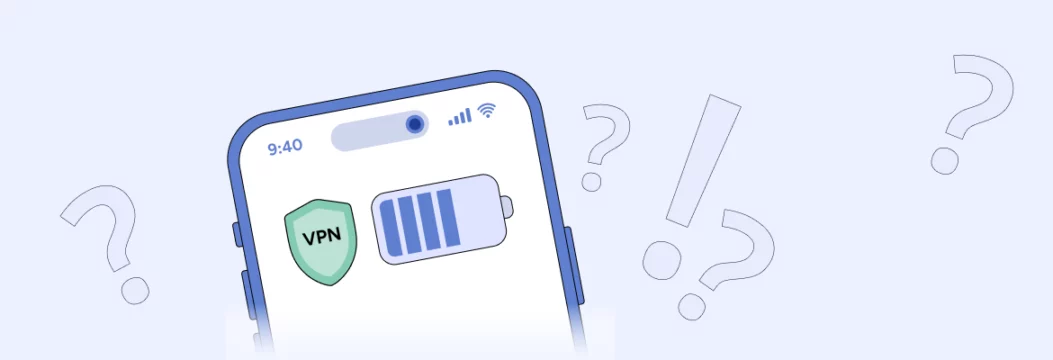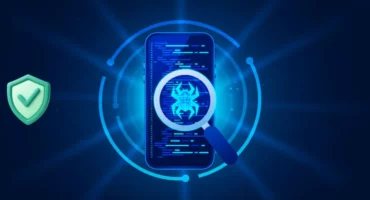Does VPN Drain Battery?
Many people are worried they may be draining their device’s battery by using a VPN. A question that is common among smartphones, laptops, and users who use the virtual private networks for their security. And, does VPN reduce battery life for the phone?
In short, using a VPN will use a little bit more battery power, but in most cases it’s not that serious. In this article, we are going to examine the effect of VPN usage on the battery life of mobile (Android/iPhone) and laptops (Windows/macOS). We will, of course, shortly examine what makes a certain VPN like VeePN battery friendly and offer practical ways to lessen battery drain when using a VPN to safeguard yourself when you are online.

Introduction to VPN and battery life
A device’s battery life could be affected by using a virtual private network (VPN). Encrypting Internet traffic, which a VPN does, requires additional processing power which means extra battery consumption. The amount of battery life impact is dependent on several factors (e.g., device type, VPN protocol, etc.) used. It is necessary to understand how a VPN affects battery life in order to reduce its drain and maximize the device’s performance.
Why VPNs can impact battery life
To understand how a VPN works, imagine that you have two computers: one sits at the other end of a circuit, and the other sits at the other end of the circuit and provides Internet access. The good thing about this process provides privacy and security, and the bad thing is that the device is doing some extra work. When in cafes or airports, accessing less secure areas, a VPN prevents sensitive information from falling into the hands of some other parties by creating a secure tunnel for data transmission. A VPN can contribute to battery usage for a few reasons:
🪫Encryption overhead: When a VPN is on, your device continuously encrypts and decrypts data. This extra processing uses CPU cycles and thus some battery power. The stronger the encryption, the more work the processor does (though modern processors are optimized to handle this efficiently).
🪫Constant data routing: A VPN keeps a secure connection (tunnel) open to a server, which can mean a constant background activity. Even if the app isn’t visibly active, it may periodically send small keep-alive signals. This continuous network use can prevent your device from going into a deep sleep state, causing a slight battery drain in the background.
🪫Increased network usage: But if you are heavy browsing, streaming or downloading, your data is routed through VPN server first. However, this will add a bit of latency and work for your device’s network radio (WiFi or cellular). Since there are a couple of additional steps being taken with data, transmitting data through a VPN tunnel takes a tiny bit more energy than going over a direct connection.
The degree to which battery life is affected varies by a number of factors for including the kind of device, VPN protocol, and usage patterns. Moreover, the location of the VPN service and the network conditions have a huge bearing on battery consumption. On your Mac, connecting to a remote VPN server is more CPU intensive, and so takes more time, which also drains more of the battery. This effect is also worsened if devices are `weak` or there is `network` traffic, as in the latter case devices will expend additional effort to maintain a stable connection.
It’s important to note that other factors usually have a much larger impact on battery life than a VPN does. For example, screen brightness and cellular signal strength are often bigger battery drains than encryption processes. In other words, the VPN’s impact exists but is relatively small – often only a few percentage points difference in battery usage, as we’ll see below. If your phone is rapidly losing battery, it’s more likely due to things like an aging battery, background apps, or a power-hungry display rather than just the VPN.
VPN battery drain on mobile devices
Using a VPN on your smartphone (Android or iPhone) will consume slightly more power than not using one, but for most modern phones the difference is quite modest. Multiple tests have shown that the battery impact of a VPN on phones is negligible to small in typical scenarios.
VPNs are commonly used for online security, anonymity, and access to georestricted content. Internet service providers (ISPs) can monitor user activities and restrict access, making VPNs essential for individuals seeking to safeguard their online anonymity and bypass potential ISP restrictions.
On mobile networks, the type of connection can influence battery usage. Using a VPN on 4G/5G cellular tends to use more battery than on WiFi, because cellular data itself burns more power. VPN or not, your phone’s radio works harder with mobile data. Let’s discuss that matter in detail:
iPhones vs. Android: Both iOS and Android handle VPN connections well, and on modern devices the difference is minor. According to VeePN’s team, a reliable VPN provider won’t cause a noticeable difference on your iPhone’s battery. Newer iPhones and Android phones have processors that include hardware acceleration for encryption, meaning they can handle VPN ciphers with minimal power cost. So if you have a recent model phone, running a VPN in the background “will be even less noticeable” on your battery usage. On older phones, the impact might be a bit larger (as older chips aren’t as efficient and older batteries don’t hold charge as well). Even then, using a lightweight protocol can keep the drain low.
One thing to watch on mobile is background apps and data-hungry activities while on a VPN. If you’re streaming HD videos, downloading large files, or doing video calls through the VPN, your phone is already working hard (big screen on, continuous data transfer). The VPN adds some overhead, but as one test showed, even with heavy streaming, the VPN-induced drain was only a few percent more battery than normal usage. When doing lighter tasks (like browsing or messaging), the VPN’s extra impact is practically negligible. And when your phone is idle or not actively transferring much data, having the VPN connected in the background uses very little power – often only a tiny fraction of a percent for keep-alive communication.
VPN battery drain on laptops
VPN battery usage isn’t just a mobile concern; laptop users on battery power might wonder about it too. The good news is that on laptops (Windows or macOS), VPNs also tend to have a minimal impact on battery life. Laptops have larger batteries and more powerful hardware, so the relative effect of a VPN can be even smaller than on a phone.
Just like with phones, the VPN on a laptop will use some CPU for encryption and maintain a network connection. However, if you’re on WiFi, the overhead is low.Running a VPN during potent laptop activities causes a minor impact on battery power consumption. The Lenovo ThinkPad experienced 35% battery usage during online video playback when the user enabled their VPN yet consumed 39% battery in the same time span. The consumption rate rises by 4% when connected to the VPN according to Surfshark which remains negligible when observing the overall battery performance. Highly CPU-intensive network operations with your laptop may cause the fans to activate while consuming extra energy because of VPN usage. Standard uses of web browsing together with email functions or streaming on laptops will experience minimal reductions in battery duration through optimized VPN client usage.
Windows vs. Mac: Both platforms have efficient VPN implementations. Most reputable VPN apps today are designed to be lightweight on desktop. If you’re using WiFi, there’s no significant difference between Windows and macOS in terms of VPN battery impact. On either system, one of the biggest factors is your network connection type: using a VPN over WiFi will be gentler on battery than using it over a mobile hotspot or USB tethering to your phone’s 4G/5G, simply because cellular data drains laptop battery quickly (and also your phone’s battery). Whenever possible, use trusted WiFi for better battery performance.
Finally, use some well known practices for battery saving on laptops. If your screen brightness is at max or you have other apps (games, video editing, or lots of browser tabs) utilizing resources, then the load added by the VPN isn’t all that significant. It’s really not that the VPN is the culprit in major laptop battery drain, the display, the disk, or even video watching itself use much more. First of all, this will not decrease the battery life of your phone by lighting the torch in the woods and making it run down the hill — unless your battery is just so garbage and broken that nothing will help it. For example, this happens more especially on a mobile device where the device’s battery life can be hurt by several other external factors.
Measuring battery drain
Measuring battery drain is crucial to understanding the impact of VPN usage on device battery life. A VPN battery drain test can be conducted by comparing battery consumption with and without a VPN connection. The test can be performed on different devices, including smartphones, laptops, and tablets, to determine the extent of battery drain. Factors such as screen brightness, background apps, and mobile signal strength can also affect battery life and should be considered when conducting the test.
Battery saver mode and VPN
Battery saver mode is a feature that helps reduce battery consumption by limiting background data usage and reducing performance. However, using a VPN can still impact battery life even when battery saver mode is enabled. Some VPNs may not be compatible with battery saver mode, which can lead to increased battery drain. It is essential to choose a VPN that is optimized for battery life and compatible with battery saver mode to minimize battery consumption.
Device hardware and battery life
The battery life is greatly dependent on device hardware. VPN usage works more efficiently on newer devices with more efficient processors and better battery technology than on older devices. Furthermore, devices with larger screen and more features may use more battery power and this can be further exaggerated by VPN usage. Choosing a device with efficient hardware, as well as optimizing VPN settings such as keeping them connected at all times, will minimize battery drain and improve performance overall.
Tips to reduce VPN battery drain
If you want to make sure your VPN isn’t taking more of a toll on your battery than necessary, here are some practical, user-friendly tips to reduce VPN-related battery consumption:
⚡Use WiFi whenever possible: As mentioned, WiFi uses less power than mobile data. If you’re on the go, connect to secure WiFi networks when you can, so both your phone and your VPN don’t have to work as hard powering the cellular radio. This can help conserve battery life.
⚡Choose an efficient VPN protocol: VPN protocols differ in speed and resource usage. WireGuard is known as one of the most battery-efficient protocols. IKEv2/IPSec is also quite lightweight on mobile devices. If your VPN app allows it, switch to a protocol that’s optimized for lower CPU usage. This can significantly cut down the extra battery drain.
⚡Only use the VPN when you need it: It’s not always necessary to have your VPN on 24/7. If you’re doing something that doesn’t require a secure connection at the moment, consider disconnecting the VPN to save power. You can also use features like split tunneling to exclude certain apps from the VPN. That way, only your sensitive traffic goes through the VPN, and other apps can connect directly – reducing the overall work ⚡the VPN has to do.
Pick nearer servers: when it comes to VPN servers located far and wide across the globe, they may cause higher latency and your device needs to work a bit harder to transfer data from one better point to the other. If you wish to save as much battery use as possible, log into a server location that is nearer to you. When it comes to the distance in the network, the less the distance, the less strain it will put on the network, which will help conserve power.While your VPN is on, all of the apps running in the background are slowing down your device to go through the VPN. When on battery, attempt to close background apps that are not needed, or pause background data intensive tasks. As general advice, not VPN-specific, it helps to keep the VPN from slowing down encrypting a bunch of background data you don’t need. Conserving battery life can also be achieved by closing unnecessary apps.
⚡Keep the VPN app updated: VPN providers often improve their apps for performance and efficiency. Make sure you’re using the latest version of your VPN app, as updates can include optimizations that use less CPU or battery. An updated app is likely to be more streamlined and stable.
⚡Use a VPN router (for WiFi usage): This is a more advanced tip – if you’re at home or carrying a travel router, you can offload the VPN work to the router. Setting up a VPN on your router means your phone or laptop isn’t doing the encryption – the router does. Then your devices connect to the router normally over WiFi. This way, your personal device battery is saved from running the VPN.
By following these tips, you can significantly reduce any VPN-related battery drain. In many cases, you might not need to change much at all – just being aware of using WiFi and efficient protocols can make a big difference. Being mindful of these practices can help minimize battery usage. And remember, if your device’s battery is very old or worn out, replacing it will likely do more to improve battery life than tweaking VPN settings.
Choosing a battery-friendly VPN
Not all VPN apps are created equal. Some are better optimized and more battery-friendly than others. Here’s what to look for when choosing a VPN, especially if battery life is a concern:
🛡️Choose VPNs that support lightweight protocols such as WireGuard or available mature versions like IKEv2 — these two are noted to be — lightweight and efficient. These are secure in a way that requires less computation. In terms of different VPN protocols, OpenVPN is usually reliable; it is heavier on the battery (particularly in TCP mode). A VPN with which you can select the protocol is useful to be able to go with lighter ones.
🛡️Battery saving features: Some of the VPN apps actually have features such as ‘low power mode’ or even give you the option to tweak how aggressively you want them to keep the connection. An example could be apps that let you disable persistent VPN while the screen is off, or apps that use fewer resources by dropping bandwidth on keep-alives in the background. Make sure there is nothing in the settings of a VPN app that has to do with power or battery. Good bets for minimal impact should be “battery-friendly” or “lightweight” in nature.
🛡️Server proximity and smart routing: A good VPN will often automatically connect you to an optimal server nearby. This not only improves speed but can save battery (as mentioned, less distance = less work). If a VPN has a large selection of servers worldwide, you’re likely to find one that’s both close and fast, reducing power consumption.
VeePN is one example of a VPN service that emphasizes performance and efficiency. VeePN’s app offers some of the most up-to-date VPN protocols, including WireGuard, which consumes less energy while still delivering a fast, secure connection. VeePN’s use of WireGuard and other efficient protocols is designed to provide strong encryption without taxing your device’s processor heavily. On iOS, VeePN also reassures users that with a trustworthy VPN provider, “you won’t even notice much difference” in battery usage, especially on newer iPhone models with optimized chipsets. In short, choosing a VPN like VeePN that invests in power efficiency can help you enjoy all the benefits of a VPN with virtually no downside to your battery life.
Conclusion
And at the end of the day, vpn uses up a bit more of your battery, but by a minor amount really. Despite this minor power cost, you generally gain more than enough security and privacy to avoid the downside. The myth that VPNs use a lot of battery has been debunked multiple times as well as tested and the impact is often only a few percent at the most and with the right settings pretty much imperceptible.
So, if you have a good choice of a VPN configured (for example, a well optimized VeePN) and some good battery saving practices, you can protect yourself online without your device dying early. In the consensus of experts, it is clear: massive apps, bright screens, and poor signals are doing the bulk of the battery killing, but a VPN isn’t the main culprit. Just keep on having your VPN on when you want it. If you use a good provider and the tips above, you can attain a secure connection and get through your work day on a single charge. Stay safe and don’t worry, your battery will not explode!
VeePN can be an ideal option for energy-efficient use of your devices. Get VeePN and use it on up to 10 devices simultaneously!
VeePN is freedom
Download VeePN Client for All Platforms
Enjoy a smooth VPN experience anywhere, anytime. No matter the device you have — phone or laptop, tablet or router — VeePN’s next-gen data protection and ultra-fast speeds will cover all of them.
Download for PC Download for Mac IOS and Android App
IOS and Android App
Want secure browsing while reading this?
See the difference for yourself - Try VeePN PRO for 3-days for $1, no risk, no pressure.
Start My $1 TrialThen VeePN PRO 1-year plan






